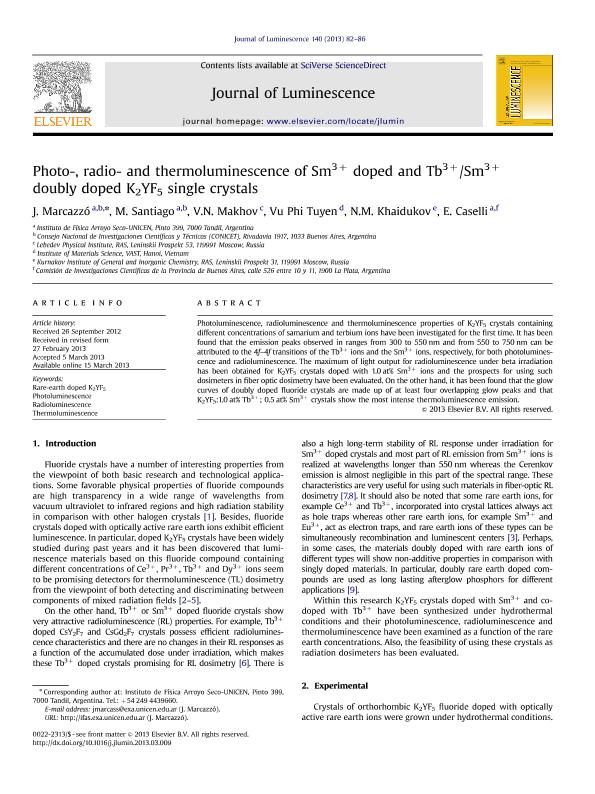Mostrar el registro sencillo del ítem
dc.contributor.author
Marcazzo, Salvador Julian

dc.contributor.author
Santiago, Martin Alejo

dc.contributor.author
Makhov, V. N.
dc.contributor.author
Tuyen, Vu Phi
dc.contributor.author
Khaidukov, N. M.
dc.contributor.author
Caselli, Eduardo Eladio
dc.date.available
2016-03-02T17:40:30Z
dc.date.issued
2013-03
dc.identifier.citation
Marcazzo, Salvador Julian; Santiago, Martin Alejo; Makhov, V. N.; Tuyen, Vu Phi; Khaidukov, N. M.; et al.; Photo-, radio- and thermoluminescence of Sm3+ doped and Tb3+/Sm3+ doubly doped K2YF5 single crystals; Elsevier; Journal of Luminescence; 140; 3-2013; 82-86
dc.identifier.issn
0022-2313
dc.identifier.uri
http://hdl.handle.net/11336/4571
dc.description.abstract
Photoluminescence, radioluminescence and thermoluminescence properties of K2YF5 crystals containing different concentrations of samarium and terbium ions have been investigated for the first time. It has been found that the emission peaks observed in ranges from 300 to 550 nm and from 550 to 750 nm can be attributed to the 4f–4f transitions of the Tb3+ ions and the Sm3+ ions, respectively, for both photoluminescence and radioluminescence. The maximum of light output for radioluminescence under beta irradiation has been obtained for K2YF5 crystals doped with 1.0 at% Sm3+ ions and the prospects for using such dosimeters in fiber optic dosimetry have been evaluated. On the other hand, it has been found that the glow curves of doubly doped fluoride crystals are made up of at least four overlapping glow peaks and that K2YF5:1.0 at% Tb3+; 0.5 at% Sm3+ crystals show the most intense thermoluminescence emission.
dc.format
application/pdf
dc.language.iso
eng
dc.publisher
Elsevier

dc.rights
info:eu-repo/semantics/openAccess
dc.rights.uri
https://creativecommons.org/licenses/by-nc-nd/2.5/ar/
dc.subject
Rare-Earth Doped K2yf5
dc.subject
Photoluminescence
dc.subject
Radioluminescence
dc.subject
Thermoluminescence
dc.subject.classification
Física Atómica, Molecular y Química

dc.subject.classification
Ciencias Físicas

dc.subject.classification
CIENCIAS NATURALES Y EXACTAS

dc.title
Photo-, radio- and thermoluminescence of Sm3+ doped and Tb3+/Sm3+ doubly doped K2YF5 single crystals
dc.type
info:eu-repo/semantics/article
dc.type
info:ar-repo/semantics/artículo
dc.type
info:eu-repo/semantics/publishedVersion
dc.date.updated
2016-03-30 10:35:44.97925-03
dc.journal.volume
140
dc.journal.pagination
82-86
dc.journal.pais
Países Bajos

dc.journal.ciudad
Amsterdam
dc.description.fil
Fil: Marcazzo, Salvador Julian. Universidad Nacional del Centro de la Provincia de Bs.as.. Facultad de Ciencias Exactas. Instituto de Fisica Arroyo Seco; Argentina. Consejo Nacional de Investigaciones Científicas y Técnicas. Centro Científico Tecnológico Tandil; Argentina
dc.description.fil
Fil: Santiago, Martin Alejo. Universidad Nacional del Centro de la Provincia de Bs.as.. Facultad de Ciencias Exactas. Instituto de Fisica Arroyo Seco; Argentina. Consejo Nacional de Investigaciones Científicas y Técnicas. Centro Científico Tecnológico Tandil; Argentina
dc.description.fil
Fil: Makhov, V. N.. Lebedev Physical Institute; Rusia
dc.description.fil
Fil: Tuyen, Vu Phi. Institute of Materials Science; Vietnam
dc.description.fil
Fil: Khaidukov, N. M.. Kurnakov Institute of General and Inorganic Chemistry; Rusia
dc.description.fil
Fil: Caselli, Eduardo Eladio. Universidad Nacional del Centro de la Provincia de Bs.as.. Facultad de Ciencias Exactas. Instituto de Fisica Arroyo Seco; Argentina. Consejo Nacional de Investigaciones Científicas y Técnicas. Centro Científico Tecnológico Tandil; Argentina. Provincia de Buenos Aires. Gobernación. Comisión de Investigaciones Científicas; Argentina
dc.journal.title
Journal of Luminescence

dc.relation.alternativeid
info:eu-repo/semantics/altIdentifier/doi/http://dx.doi.org/10.1016/j.jlumin.2013.03.009
dc.relation.alternativeid
info:eu-repo/semantics/altIdentifier/issn/0022-2313
dc.relation.alternativeid
info:eu-repo/semantics/altIdentifier/url/http://www.sciencedirect.com/science/article/pii/S0022231313001336
Archivos asociados
